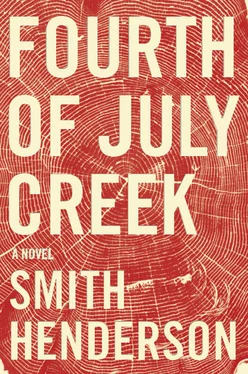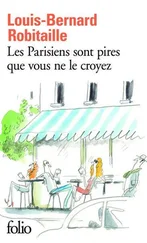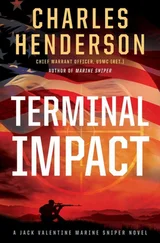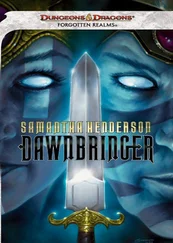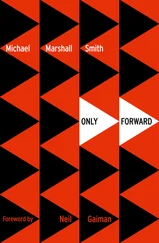“Fucking Texas?” he asked.
He looked about. Bright squares of fresher paint where the pictures had been removed. Indentures of the couch feet in the rug.
“Yeah, Pete. Texas.”
“And you don’t ask me.”
“I don’t gotta ask you where I can live.”
“The hell you don’t, Beth. She’s my daughter.”
“You’re welcome to take her up into the woods with you. If she’d go.”
Backlit from the sunlight in the kitchen, his daughter appeared or might have been in the doorway the whole time. Nearly featureless in the shadows, a cutout. Knobbed at the knees, holding her kindling arms across her. Knowing if he went toward her she’d bolt to her room and slam the door, but he did anyway and she did, of course, run to her room.
“Applesauce, come on.”
She was thirteen. She hated him.
He stood in the kitchen. Beth’s keys were on the table. She saw him looking at them and she picked them up and chucked them at his chest.
“Keep us in the pumpkin shell. Right?”
She crossed her arms. Dare-faced.
He shot out the door with the keys.
“Ah hell, Pete!” Beth yelled.
She pursued him around the house, and catching him just as he reached the lilac bush, landed small blows to his head with her little pool-ball fists, and then all atangle they trundled through the brush and down the sharp incline to the rocks by the river. She clung to his arm so that he couldn’t get a good throw, and the keys plunked into the water not far from the shore. He shucked her off. She pelted his back with river rocks, and he climbed the bank wincing, and sprinted to the house, flung open the back door, and strode down the hall and into his daughter’s doorway.
Rachel folded clothes kneeling on the floor, stacking them in little piles. Sparkling denim skirts. Striped shirts the colors of candy. She shoved things into a neon grip. She wore lip gloss and blue eye shadow, and her thin wrists were bangled with colored bands.
“Tell her you don’t want to go,” he said.
Homosexuals postered to her walls in blouses and fishnet gloves pouted at him. She stood up and walked calmly to him on flounced pink socks. Almost balletic in the precise placement of her feet.
“Come here,” he said, throwing his arms wide. The contempt shimmered off of her like actual heat, as though he’d opened a furnace.
She closed the door on him. The small clatter of the hook-and-eye lock.
He was muttering promises against the door when Beth’s tennis shoes slapped on the kitchen tile. She could see him in the hall from where she sat at the kitchen table, little puddles at her feet.
“You’re a son of a bitch, Pete.”
She pulled off her wet shoe with effort and chucked it at him.
“You buy her all that makeup?”
“And beer and rubbers.”
“You’re not kidding.”
“Christ, Pete.”
“Not much. You’re not kidding very much.”
“You don’t get to social work me!” she yelled. “You just don’t. You split. It got rough here and you went to live in Tenmile. That was your decision.”
“You made decisions too.”
She threw her other shoe at him. He leaned away and it spanked the wall.
“I’m not apologizing again. I’m not. I’m done trying to get your forgiveness. And I tried, Pete. Oh, I tried and tried and tried. I called you and called you and we went up there to see you. And what happened when we went up there to see you, Pete?”
“Just don’t go,” he said to the floor.
“Did you come out of that shitty cabin? Did you come out and see your own daughter, Pete?”
He looked up at her.
“You’re like an accident,” he said. “You’re like I was hit by a truck.”
“Oh my God.”
“I’m not looking at a person right here in front of me. You’re more like a bad thing that happened to me.”
Her laugh was sharp, a bark.
“That’s really deep, Pete.”
She grabbed some mail from the table and went through it, tossing what was addressed to him at his feet. Then she tore a bill open and wrote on the inside of the envelope and handed him the scrap. She said it was the address in Waco. That he could write to Rachel if he wanted. That he could start to send money if he was worth a shit at all.
The bartender at the Stockman’s knew him, and Pete turned around and exited onto the street to avoid him. He was so inconsolably angry. He crossed the street behind a truck stamped FISH and was nearly hit by a Chrysler Imperial that screeched to a stop kissing his hip. Pete leered through the windshield with his hands on the hood of the car, the occupants dimly cognizant of his rage. He went up the block on Higgins scarcely aware of the foot traffic, the few ladies window-shopping the jewelry at Stoverud’s, a pair of businessmen slapping shoulders. He ducked up the alley and tried the back door of the Missoula Club, but it wouldn’t open for him. He scowled at the backside of the Howard Apartments. Some windows thrown open to the warmish noon, revealing the top of a television and a pair of naked feet a floor up. An argument broadcast from another of the upper rooms. Pigeons cooed and shook and bickered in the brick eaves and let fall a sleet of white shit and feathers. He pounded until a grim aproned barkeep unbolted the door. They looked at one another with mutual irritation.
“You open or not?” Pete asked.
The man stood aside and let him in. Pete sat at the bar and fingered the coin-scored divots in the pine, waiting for the bartender to pull his beer. He had most of it pumped down his throat by the time the man had extracted his change from the old-fashioned black niello register. Pete left the money where the man put it, and slid the glass at him. The bartender chewed his cheek.
“Chop chop,” Pete said.
The man poured another, and Pete burped silently and drank under the man’s gaze. The bartender went to the small cutting board near the griddle and cut onions and came back wiping his hands on his apron and filled Pete’s beer and held up a bottle from in front of the mirror. Pete nodded. He poured them each a shot. Glasses clinked, the liquor hot and smoky. The bartender sucked the bourbon from his mustaches and then cooked Pete a burger and put the paper plate in front of him. Said for him to eat something.
“That’s all right,” Pete said.
“It’s eleven o’clock in the morning, pal. Eat something, you’re gonna drink like that in here.”
Pete swallowed the last of his beer and slowly fingered out his change to the man, and told him he’d take a pint of Redeye. The bartender just stood there. Pete took a bite from the burger and chewed enormously. The man fetched down a pint bottle from the shelf, sleeved it in a paper sack. He snatched it back when Pete reached for it.
“I don’t want to see you in here again. Not today.”
On the sidewalk he looked around for a place to open the bottle. He turned and went to where Ryman Street quit in a parking lot by the river. He hopped down the riverbank clutching the alders for balance and pushed through a brake of Russian olive. He perched on a stripped cottonwood worn smooth by the water, the wood warmed by the sun. The Clark Fork River churned heedlessly past. Paper litter garlanded the thin trees nearby. A rufous barrel shipwrecked on the rocks. He uncapped the bottle and drank from the sack, visible in his seething to the pedestrians and the cars crossing the Higgins Street Bridge. Kingfishers chittered. Water skippers skated on a puddle by his feet.
There was a time with his wife on this river or a river just like it, it can’t be this river, but in his memory it is this one. A time on a wash just like this where he lay shirtless with her shivering in the August night, jeans pasted dark and wet to his knocking legs, his torso white to glowing in the moonlight. Her hair tendriled and framed about her face like an outlandish black tattoo. Her wet dress like a sleeve of molting skin, which of a sort it had been that whole night in their dancing. Her heart in its red and white cage knocking just inches from his own, like two young prisoners tapping out simpleton Morse I am here I am here I am here. Here I am for your pleasure for you forever. On a river like this where he impregnated her. A river promise too, he said I love you I love you. Seventeen years old. A pleasure so total that even then he knew he had mortgaged years to her and he did not care.
Читать дальше
